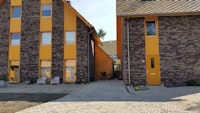Table of contents
Congratulations, you have decided to buy a house! An exciting step in your life that involves a lot, both emotionally and financially. In addition to the price of the house itself, there are other costs you need to consider. One of the most important costs is the so-called "kosten koper" (buyer's costs). But what exactly do these costs entail, and what amounts should you take into account? We'll explain it to you.
You've probably noticed when you look at a property on Funda or another real estate website: after the asking price, 'k.k.' or 'v.o.n.' is mentioned. These two abbreviations tell you, as the buyer, something about which costs are and aren't included in the asking price. This way, you immediately know which costs you should consider when purchasing your home.
What are the buyer's costs?
When 'kosten koper' (k.k.) is listed after the asking price, it means you as the buyer are responsible for the following extra costs:
- Transfer tax
- Notary costs
- Mortgage costs (if applicable)
- Real estate agent (if applicable)
- Other costs (if applicable)
If you purchase a house with buyer's costs, it means you will spend more than just the purchase price. Naturally, you want to know what these extra costs are and how much money is involved. Below is an overview of the additional costs you incur, in addition to paying the purchase price.
Purchase price k.k.
+ transfer tax
+ notary costs
+ mortgage costs
+ real estate agent
_______________________________________
= what you actually have to pay
Free on name
Do you see 'v.o.n.' after the asking price? This means you buy the property free on name. All legal costs for the purchase of the house are already included in the price. Read more below about buying a property free on name.
- Receive proposals from multiple agents
- Get clarity about the costs upfront
- Choose based on performance and results
- Over 3000 people went before you
- Free & non-binding
- Independent
- Non-binding
- Free
- Fast

What is the percentage of buyer's costs on the purchase price?
When looking at properties, it helps to quickly estimate what the percentage of buyer's costs is. The percentage of k.k. generally lies between 4.5% and 6.5% of the purchase price. You can assume a percentage of 5.5%. In our calculation example, we arrive at a percentage of 4.5% of the purchase price (see above).
What amounts should I consider for buyer's costs?
If you buy a house with buyer's costs, then consider the following additional costs (besides the purchase price):
1. Transfer tax
The transfer tax for properties in the Netherlands in 2023 depends on the group to which you belong:
- General rate: 10.4% transfer tax on the purchase price k.k.
- Buyers from 35 years who will live in the property themselves: 2% transfer tax on the purchase price k.k.
- Starters younger than 35 years: no transfer tax*
Example: you are 38 years old and buy a property with buyer's costs. The purchase price is € 350,000. You then pay € 350,000 x * 0.02 = € 7,000 transfer tax.
For more information on the transfer tax, we refer you to Rijksoverheid.nl.
* Are you younger than 35 years and buying a property? Then you can make use of a one-time exemption from transfer tax. You do not have to pay transfer tax when purchasing your home. This saves you thousands of euros and is certainly worth it. The exemption applies in 2023 up to a valuation of € 440,000 and only for properties you will personally use as your main residence. For a higher valuation, you pay 2% transfer tax.

2. Notary costs
When purchasing a house, it is required that you, as the buyer, engage a notary. The notary will draft official documents, such as the transfer deed and mortgage deed, which are legally binding. Each notary applies their own rates for these services. Additionally, costs are charged for registering the deeds with the Land Registry.
Notary costs usually range between € 1,000 and € 3,000. This depends on the complexity of the documents to be prepared. On average, the notary costs are € 2,000 for the purchase of a house and the mortgage.
3. Costs for the mortgage (if applicable)
If you need a mortgage for the purchase of your house, you will incur additional costs associated with the mortgage. Consider:
- Costs for a mortgage advisor: this will cost you on average € 2,250. Some advisors charge a fixed amount, others an hourly rate.
- Appraisal report for the bank: this will cost you on average € 750, including VAT and all expenses (advances).
- Mortgage deed: finally, a mortgage deed must also be signed at the notary for a mortgage. To keep it clear, we have already included these costs with the notary costs (see '2. Notary costs' above). You will receive one invoice with the various items.
4. Costs of the real estate agent (if applicable)
Hiring a real estate agent is not mandatory, but many people like to use one (it is certainly not a luxury in a heated real estate market). If you are assisted by a real estate agent, consider a 'mediation fee' of about 1% of the purchase price (k.k.).
For a property of € 350,000, you will pay an 'acquisition fee' of € 3,500 to the real estate agent. This is a considerable amount, but be aware that a real estate agent assists and advises you in the bidding and negotiation process. This allows you to purchase your property at a sharper amount.
Want to know what other costs you will incur when buying a property, besides the purchase price and buyer's costs? You can read it in our article about all costs when buying a house.
Through Mijn Verkoopmakelaar, you can quickly and easily find the best real estate agent in your area. Sign up and find the agent that suits you.
Find a purchasing agent- Independent
- Non-binding
- Free
- Fast
5. Other costs (if applicable)
In addition to the transfer tax, notary costs, mortgage costs, and real estate agent fees, you may also incur:
- Costs of a structural survey: if you want more insight into the technical state of the property and possible hidden defects, you can choose to have a structural survey performed. In the case of a new build, this is called a 'completion inspection'. This is an inspection by an expert who assesses whether the house is in good condition and whether there are any hidden defects. Costs vary depending on the property, size, location, and complexity of the inspection. For a standard structural survey, you can expect a price between €250 and €450.
- NHG costs: the application costs for the National Mortgage Guarantee are in 2023 0.6% of the mortgage amount. However, there is an interest advantage in return, allowing you to quickly recoup these costs.
- Bank guarantee: when buying a property, you sign a purchase agreement. In most cases, the selling party requires a down payment or bank guarantee after signing the purchase deed. This is intended to give the seller more certainty that you will actually purchase the property. The down payment is usually 10 percent of the agreed purchase price and must be paid within two weeks of signing the purchase deed. If you do not have the necessary funds or choose not to deposit it yourself, you can have a bank guarantee issued. In that case, the bank guarantees the amount in question. You usually pay 1% of the amount for which the bank guarantees.
 Calculating buyer's costs
Calculating buyer's costs
General overview: amounts and percentages of buyer's costs
Transfer tax
- 10.4% on the purchase price k.k. (general rate)
- 2% on the purchase price k.k. (buyer from 35 years who will live in the property themselves)
- No transfer tax (starters younger than 35 who meet conditions)
Notary costs
- € 2,000 (average notary costs incl. costs of mortgage deed)
Costs for the mortgage (if applicable)
- € 2,250 (average costs of mortgage advisor)
- € 750 (average costs of appraisal report)
Costs of the real estate agent (if applicable)
- 1% of the purchase price k.k.
Other costs (if applicable)
- € 350 (average costs of a structural survey)
- 0.6% mortgage amount (NHG costs)
- 1% of the guarantee amount (bank guarantee costs)
Example calculation of buyer's costs
Below is an example calculation of buyer's costs at a purchase price of € 350,000 for a person aged 38 who will live in the property themselves (as their main residence). They need a mortgage for the full purchase price and use a real estate agent. They have a structural survey performed, do not need a bank guarantee, and do not use the NHG.
| Transfer tax | € 7,000 (2% x € 350,000) |
| Notary costs | € 2,000 |
| Mortgage advisor | € 2,250 |
| Appraisal report | € 750 |
| Real estate agent fees | € 3,500 (1% x € 350,000) |
| Structural survey | € 350 |
| Total buyer's costs: | € 15,850 (4.5% of the purchase price) |
Can I finance the buyer's costs within my mortgage?
By 'financing' the buyer's costs, we mean the question of whether you can include the extra costs (which you incur for buyer's costs) in your mortgage. Previously this was possible, but since 2018 the rules for the maximum mortgage have been tightened. This means (among other things) that in 2023 you can borrow a maximum of 100% of the property value.
Additional costs, such as the buyer's costs, cannot be included in the mortgage unless the property value is higher than the purchase price (higher valuation). So, in most cases, you must have enough savings to pay for these costs. Think of an amount of about 4-6% of the total cost of the house for the buyer's costs (k.k.).
Are the buyer's costs tax-deductible?
Deductions are costs you can fully subtract from your income tax. Some of the buyer's costs (k.k.) can be deducted from your taxes.
The following costs are one-time deductible:
- Mortgage advice
- Notary costs for the mortgage
- Appraisal report
- Application for National Mortgage Guarantee
The following costs are not deductible:
- Transfer tax
- Real estate agent
As a basic rule, all costs related to obtaining a mortgage are deductible. All other costs are not deductible. For more information about deductions, we refer you to the Tax Office.
Through Mijn Verkoopmakelaar, you can quickly and easily find the best real estate agent in your area. Sign up and find the agent that suits you.
Find a purchasing agent- Independent
- Non-binding
- Free
- Fast
More about buying a property:
Find the best real estate agent for selling your house
For English:
Frequently asked questions about k.k. (Kosten Koper)
What does k.k. mean after the asking price?
'k.k.' means that the property is offered with Kosten Koper. This means that in addition to the purchase amount, you also have to pay the costs for the notary and the transfer tax. Additionally, there may be other costs, such as mortgage costs and real estate agent fees. The opposite of k.k. is v.o.n. (Vrij op naam). An asking price v.o.n. means that all costs for the purchase of the house are already included in the asking price.
What additional costs are there if the asking price is k.k.?
If there is a 'k.k.' after an asking price, it means you as the buyer must pay the following additional costs:
- Transfer tax
- Notary fees
- Mortgage costs (if applicable)
- Purchase real estate agent (if applicable)
- Other costs (if applicable)
What is the percentage of Kosten Koper on the purchase price?
If you are searching for a property, it is useful to quickly estimate the percentage of Kosten Koper. Generally, this percentage is between 4.5% and 6.5%. An average of 5.5% can serve as a reference. In our calculation example, you can see which costs have what share in the calculation.
Can you finance the additional costs in the mortgage?
In most cases, you cannot. Since 2018, you are not allowed to finance more than 100% of the appraised value. If the purchase price of your property is as high as the appraised value, you have to pay the additional Kosten Koper costs out of your own pocket. You cannot pay this amount from your mortgage. If the appraised value of your property is higher than the purchase price, you can finance the Kosten Koper.
















